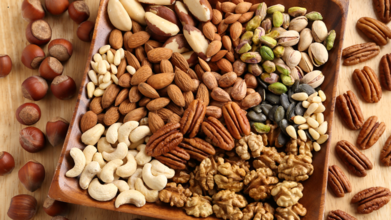- Health Conditions A-Z
- Health & Wellness
- Nutrition
- Fitness
- Health News
- Ayurveda
- Videos
- Medicine A-Z
- Parenting
- Web Stories
Patrick Mahomes's Favourite Superbowl Snack Has This One Harmful Ingredient

Credit: Canva
Patrick Mahomes has been in news because of his ankle injury. However, there is another thing that is being searched about him the most and that is his favourite snacks. Patrick has a favourite that might surprise people who haven't been following quarterback during his meteoric rise with the Kansas City Chiefs. It's the humble condiment we know as ketchup.
During a recent interview for InsideHook, he admitted that when he was younger, he regularly ate ketchup sandwiches. Though he claims he no longer eats them, he hasn't given up on ketchup. In fact, it has been reported several times that he puts ketchup on tons of foods, including steaks, macaroni and cheese. But is it heathy?
Health experts say no! It is because of its high sugar content. One tablespoon of ketchup contains 3.62 grams of sugar. Given that the American Heart Association recommends limiting your daily sugar intake to 25 grams for women and 36 grams for men, those 3.62 grams can make you max out on your sugar pretty quickly. (Plus, let's be honest: How many people use only one tablespoon?)
It only makes sense that ingesting sugar would elevate your blood sugar. But why is that a big problem? For one, excessive sugar can lead to unintended weight gain. However, adding pounds isn't the only result you might experience if you overload on sugar; you could also put yourself at greater risk of developing other cognitive and physical conditions.
For instance, a 2024 review in Frontiers in Nutrition found that consuming sugar could raise an individual's risk of depression by 21%. A 2020 clinical trial published in the Journal of Nutritional Science and Vitaminology showed a correlation between high dietary sugar intake and a higher likelihood of cardiovascular disease (read how eating too much sugar can impact your cholesterol). Consequently, the researchers recommended limiting sugar to less than 10% of calories eaten each day.
3 Types of Sugar That Commonly Trigger IBS Symptoms

Credits: Canva
Irritable bowel syndrome (IBS) affects an estimated 12% of the U.S. population, causing symptoms such as abdominal cramps, bloating, diarrhea, and constipation. While some individuals experience only mild discomfort, others find their daily life disrupted by the condition. Despite its prevalence, IBS remains complex, with no single known cause.
Doctors and dietitians increasingly advise patients to focus on identifying and avoiding specific food triggers, particularly sugar.
Why Sugar Can Be a Gut Trigger
When you eat sugar, your small intestine breaks it down using specific enzymes. Once processed, the sugar is absorbed into the bloodstream for energy. But for people with IBS, this process can go awry.
Some may lack sufficient enzymes to digest certain sugars, resulting in digestive distress. Others may have altered gut bacteria or hormonal fluctuations that make their digestive system more sensitive. Not all sugars cause issues for everyone with IBS, so identifying personal triggers is a crucial step in managing the condition.
The Worst Offenders: High FODMAP Sugars
Many sugars that worsen IBS symptoms fall into a category known as high FODMAP foods, short for fermentable oligosaccharides, disaccharides, monosaccharides, and polyols. These are carbohydrates that are poorly absorbed in the small intestine and can ferment in the colon, leading to gas, bloating, and other IBS symptoms.
Sucrose (Table Sugar):
Common in desserts, baked goods, and even savory packaged foods, sucrose is made of glucose and fructose. It’s one of the most frequently used sweeteners and a known trigger for some people with IBS.
Fructose:
Found naturally in fruit and added to many sugary beverages and snacks, fructose is another major culprit. High-fructose fruits like apples, grapes, and pears, along with honey and agave, may worsen symptoms. Safer alternatives include citrus fruits, cantaloupe, and berries.
Lactose:
A sugar found in milk and dairy products, lactose requires the enzyme lactase for digestion. Many adults don’t produce enough lactase, which can lead to lactose intolerance—especially problematic for people with IBS.
Are Sugar Substitutes Any Better?
Many people with IBS turn to sugar-free alternatives, but not all substitutes are safe bets.
Sorbitol and Xylitol, often found in sugar-free gum and candy, are known to trigger abdominal cramps and diarrhea in people with IBS. While stevia may be a safer alternative, more research is needed. Even natural sweeteners like honey or agave should be approached with caution due to their high fructose content.
It’s Not Just Sugar: Other Foods to Watch
Sugar isn’t the only food that may cause trouble. Other common IBS triggers include:
- Beans and lentils
- Cruciferous vegetables (like broccoli and cauliflower)
- Onions and garlic
- Gluten
- Chocolate and spicy foods
- Fried or processed foods
- Caffeine and alcohol
An elimination diet guided by a registered dietitian may help pinpoint which of these are problematic.
Could It Be Sucrose Intolerance?
In some cases, symptoms similar to IBS may actually be caused by congenital sucrase-isomaltase deficiency (CSID), a rare genetic disorder. People with CSID lack the enzymes needed to digest sucrose and maltose, leading to symptoms like bloating and diarrhea immediately after eating sugar-containing foods. This condition is usually diagnosed in childhood and can lead to developmental issues if not managed.
Sweet Solutions for IBS Relief
Living with IBS doesn’t mean you have to completely give up sweets, but moderation and awareness are key. Some people find they can tolerate small amounts of certain sugars without triggering symptoms, while others need to avoid them entirely.
Are Nuts Really Good For Your Heart?

Credits: Canva
Don’t be fooled by their size, nuts are nutritional powerhouses that may offer major benefits for your heart. High in healthy fats, protein, vitamins, and minerals, these plant-based snacks are increasingly being linked to reduced risk of cardiovascular disease, better cholesterol levels, and even reduced inflammation.
Backed by research from institutions including the British Heart Foundation and several clinical trials, nuts like almonds, walnuts, macadamias, and even peanuts (technically legumes) are showing potential to improve heart health when eaten regularly, just a few handfuls a week may do the trick.
What the Research Says
A 2020 study involving three large cohorts looked at the cardiovascular effects of increasing nut intake to at least half a serving daily over a four-year period. The results were clear: people who consumed more nuts had significantly lower risks of key cardiovascular conditions.
- 8% lower risk of cardiovascular disease
- 6% lower risk of coronary heart disease
- 11% lower risk of stroke
The most benefits were seen with increased consumption of tree nuts, walnuts, and peanuts. Interestingly, participants who decreased their nut intake over the same period were found to be at a higher risk for these conditions.
Even more promising: replacing red meat, refined grains, and even desserts with nuts was associated with a 7% to 13% lower risk of cardiovascular events.
Better Cholesterol Without the Weight Gain
A separate 2021 clinical study looked at 52 adults at risk of heart disease. After consuming 68 grams (about half a cup) of pecans daily for eight weeks, participants showed:
- 5% decrease in total cholesterol
- 10% drop in LDL “bad” cholesterol
- Increase in HDL “good” cholesterol
Reduced triglycerides and improved TC/HDL ratio
The research underscores a key finding: even small improvements in LDL cholesterol—just 1%, can translate to up to a 2% lower risk of coronary artery disease.
Despite their calorie density, nuts don’t appear to contribute to weight gain. A 2020 review of 55 studies confirmed that nut consumption had no effect on body weight, BMI, or waist circumference. In fact, some individuals even experienced reduced body fat.
Nuts May Reduce Inflammation Too
Inflammation is a major player in atherosclerosis and heart disease. A 2020 study involving 634 participants tested the anti-inflammatory effects of nuts, specifically walnuts. Consuming 30 to 60 grams of walnuts daily over two years significantly reduced 6 out of 10 inflammatory markers. This suggests that nuts may offer cardiovascular protection not just through fats and fiber, but also through anti-inflammatory mechanisms.
Which Nuts Are Best?
While most nuts offer similar fat and calorie content, some pack more specific heart-friendly nutrients:
- Almonds: High in vitamin E, calcium, magnesium, and potassium
- Walnuts: Rich in omega-3 fatty acids (alpha-linolenic acid)
- Macadamia nuts: Abundant in monounsaturated fats and magnesium
- Hazelnuts: Offer vitamin E, copper, and magnesium
- Peanuts: Technically legumes, but still rich in protein, fiber, and niacin
When shopping, opt for raw or dry-roasted, unsalted varieties with the skin on (where applicable) for added antioxidants.
Final Word: A Smart Snack for a Stronger Heart
Adding just 3 to 4 small handfuls of nuts per week, about 15 grams each, could be a simple yet powerful step toward better heart health. They’re versatile, satisfying, and science-backed.
However, individuals with nut allergies should steer clear and consult labels for safety. And as always, consult a doctor or dietitian before making major dietary changes.
Food Myth Debunked - Eating Sugar Doesn't Make You Crave It More

(Credit-Canva)
We have all had times when we want nothing more than a doughnut or chocolate. Having sweets can help lift up our mood, however, excess of it is not good for our health either. A big cause of concern for people, however, was the fear of craving sugar, because many of them believed that having sugar meant craving it.
A new study challenges the common belief that eating sweet foods makes you crave them more. Researchers found that a person's preference for sweet flavors isn't affected by how much sugar they eat. In a six-month study, people who ate more or less sweet foods showed no real changes in how much they liked sweet tastes.
The study done by researchers at the Wageningen University also found that diets with different levels of sweetness didn't affect how many calories people ate or their body weight. The researchers concluded that sweetness alone isn't the reason people consume too many calories, even though many people think it is.
Filling a Research Gap
Most previous studies on sweet tastes have been very short, lasting only a day. This meant there wasn't a lot of information on whether a person's preference for sweetness could change over a longer period.
To solve this, researchers designed a six-month study. They gave food and drink packages to 180 volunteers, providing about half of their daily meals. The participants were split into three groups: one with a diet of mostly sweet foods, one with less sweet foods, and one with a mix. To keep the study fair, the foods given to each group had the same balance of carbohydrates, fat, and protein. The volunteers were also sorted into groups to make sure they were similar in age, sex, and body weight.
Surprising Results
After six months, the study showed that participants' preference for sweetness stayed the same, regardless of the diet they were on. The group that ate fewer sweet foods didn't lose their taste for them, and the group that ate more sweet foods didn't crave them more.
The study also found no link between eating more or less sweet foods and changes in body weight or health markers for diseases like diabetes. Once the study was over, the participants naturally went back to eating the same amount of sweet foods as they did before the study began.
Implications for Health and Diet
This research is important because it's one of the first studies to look at how different levels of sweetness in an entire diet affect people over a longer period. Some people avoid sweet foods because they believe it will increase their preference for them, but these results show that isn't the case.
The researchers now plan to repeat the study with children, who may be more likely to have their taste preferences and eating habits change over time.
Why Do We Crave Sugar?
According to the Cleveland Clinic one major reason we crave sugar is because of how it affects our brains. Sugar makes us feel good by releasing chemicals like serotonin. This creates a cycle where we want to feel that good feeling again and again.
Additionally, many processed foods are loaded with sugar because it triggers the release of dopamine, a brain chemical that motivates us to seek out more of what we find rewarding. Over time, our tolerance for sweet foods can build up, leading us to need more to get the same satisfying feeling. If you're looking to cut back, here are some tips to help you get control of your cravings:
Check your energy levels
Before you grab a sugary snack, consider if you're truly hungry or just tired. If fatigue is the problem, try taking a short walk or doing some other physical activity to boost your energy instead.
Drink water
Sometimes, our bodies mistake thirst for hunger. Staying properly hydrated can help you avoid unnecessary cravings.
Choose a healthy snack
When you need a snack, choose one that combines fiber-rich carbohydrates with a lean protein or healthy fat. An apple with peanut butter or Greek yogurt with cinnamon will provide a longer-lasting source of fuel than a sugary treat, which only gives a short-term boost.
© 2024 Bennett, Coleman & Company Limited

